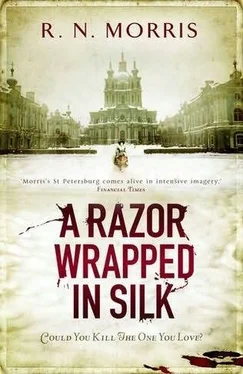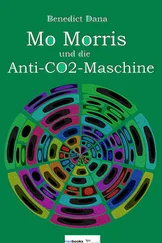R. Morris - A Razor Wrapped in Silk
Здесь есть возможность читать онлайн «R. Morris - A Razor Wrapped in Silk» весь текст электронной книги совершенно бесплатно (целиком полную версию без сокращений). В некоторых случаях можно слушать аудио, скачать через торрент в формате fb2 и присутствует краткое содержание. Жанр: Исторический детектив, на английском языке. Описание произведения, (предисловие) а так же отзывы посетителей доступны на портале библиотеки ЛибКат.
- Название:A Razor Wrapped in Silk
- Автор:
- Жанр:
- Год:неизвестен
- ISBN:нет данных
- Рейтинг книги:5 / 5. Голосов: 1
-
Избранное:Добавить в избранное
- Отзывы:
-
Ваша оценка:
- 100
- 1
- 2
- 3
- 4
- 5
A Razor Wrapped in Silk: краткое содержание, описание и аннотация
Предлагаем к чтению аннотацию, описание, краткое содержание или предисловие (зависит от того, что написал сам автор книги «A Razor Wrapped in Silk»). Если вы не нашли необходимую информацию о книге — напишите в комментариях, мы постараемся отыскать её.
A Razor Wrapped in Silk — читать онлайн бесплатно полную книгу (весь текст) целиком
Ниже представлен текст книги, разбитый по страницам. Система сохранения места последней прочитанной страницы, позволяет с удобством читать онлайн бесплатно книгу «A Razor Wrapped in Silk», без необходимости каждый раз заново искать на чём Вы остановились. Поставьте закладку, и сможете в любой момент перейти на страницу, на которой закончили чтение.
Интервал:
Закладка:
Virginsky came in, holding up a small cardboard box, which Porfiry recognised as the sort used to hold evidence. In his other hand, he held a police folder.
‘What have you there, Pavel Pavlovich?’
Virginsky crossed to Porfiry’s desk, where he lifted the lid of the box and tipped out its contents, a silver ring. ‘I took the liberty of retrieving this. It is the ring that we found on Yelena Filippovna’s thumb.’
Porfiry made no move to pick the ring up, as if he believed that to do so would take them one step closer to the unthinkable.
‘You will remember,’ said Virginsky, picking up the ring himself and almost thrusting it in Porfiry’s face, ‘the emblem of the house of Romanov — the imperial symbol of the double-headed eagle — embossed on the face of the ring.’
‘Yes,’ said Porfiry. ‘I remember it well.’
‘It is the same size, is it not, and approximately the same shape, as the strange bruise we found repeated on each of the children’s necks?’
‘I would need to take precise measurements to be certain.’
‘I have already done so.’
Porfiry met this statement with a sceptical start.
‘The Romanov symbol on this ring is one fifth of a vershok in height, by one tenth in width. Almost precisely the measurements taken by you yourself from the necks of the dead children. Furthermore, the similarity between this motif and the mark is striking.’ Virginsky opened the folder and shook. It was almost as if the contents were reluctant to come out into the light of day. Porfiry saw that the folder contained photographs. They stuck together, hiding one behind the other, shy, awkward, out of place. Ruthlessly, Virginsky prised them out and laid them side by side on Porfiry’s desk.
Porfiry knew the subjects of these photographs well. He had spent hours studying the luridly coloured three-dimensional objects now represented in flat monochrome. And yet the images still shocked him. He might have expected the mediation of photography to soften the horror, rendering the blood and bruising of the neck stumps in various depths of grey. To some extent that was true. But this neutralising effect paradoxically also added to the power of the images. The shock was one of intense pathos, rather than pure horror. For a brief moment, he could almost believe he was looking at studio portraits; that he saw in the eyes of the three subjects the earnest innocence of children looking forward to their lives, trusting, hopeful, and slightly overawed. But eventually his own eye tracked down to the abrupt line and the inky void at the end of the truncated neck.
Porfiry sighed out a cloud of smoke.
Neither man spoke. Porfiry went back to opening his mail as if Virginsky had said nothing remotely of interest to him. Virginsky returned the ring to its box and replaced the lid, though he left the photographs on Porfiry’s desk. He then took out from the inside pocket of his frock coat a folded sheet of paper. ‘I have written my report, based on these findings.’
Porfiry nodded.
‘The burden of my report,’ continued Virginsky, ‘is that circumstantial evidence strongly suggests the possibility that Yelena Filippovna Polenova murdered Dmitri Krasotkin, Artur Smurov and Svetlana Chisova.’
‘For what motive?’
‘I do not speculate as to her motive. That must remain closed off from our enquiry. She is after all dead. And you know the saying, the soul of another is like a dark cellar. However, I would suggest that the deaths of these three children are not unconnected to her own death, and in fact provided her murderer with his motive.’
‘Which is?’
‘To prevent any further killing.’
‘You are suggesting that Yelena Filippovna was subject to uncontrollable murderous impulses and that the only way to curtail her homicidal activities was to kill her?’
‘You may put it like that, if you wish. Mizinchikov loved her but somehow he found out about her crimes. Perhaps she told him herself, to taunt him. Or perhaps this is what lies behind the fact alluded to in Prince Sergei’s testimony, that Yelena Filippovna sought her own death. Guilt, and a horror at her own actions, prompted her to make that grotesque demand. And consider what effect this revelation would have had on Captain Mizinchikov’s mind. To be confronted with such horror, to discover that the woman he loved was a monster. Rage, perhaps, played a part in it. Fear, too. And love. He would not have wanted this horrific truth to get out. Killing her was one way to keep her secret safe. She would never be in a position to reveal it herself, at least.’
‘But why would she kill the children? That is the point past which I cannot get,’ protested Porfiry.
‘I don’t know,’ admitted Virginsky. ‘But I fear that it may have something to do with Maria Petrovna. She is the connection between Yelena Filippovna and the dead children. Did not Prince Sergei say that Maria Petrovna’s school was a cause close to Yelena Filippovna’s heart? Perhaps it held a special place there, but not in the way that Prince Sergei imagined.’
‘All this is dependent on a colossal supposition — no, worse than that, two colossal suppositions. First, that the distinctive marks on the children’s necks were caused by the impression of a ring. Second, that the ring responsible is that worn by Yelena Filippovna. You realise, Pavel Pavlovich, that if either of these suppositions is false, then the flimsy construction of your theory will collapse.’
‘ My theory? All I have done is put into words what you yourself suspected when we first saw the marks on the children.’
‘Be that as it may, whoever is to be credited with this theory, it remains unproven, and, frankly, incapable of proof.’
Virginsky appeared sanguine in the face of Porfiry’s objections. ‘For the time being, yes. But as soon as we find Captain Mizinchikov, he will be able to confirm it.’
‘If he chooses to co-operate,’ said Porfiry dubiously. ‘It is conceivable that he would deny such a construction of events, in order to protect the memory of Yelena Filippovna.’
‘But it places his own crime in an entirely different light. You know the way our Russian juries are. Excitable, and sentimental. Above all, inexperienced. No Russian jury would convict him. He will be seen as a saviour of children. If he could be persuaded to see the affair in those terms, with the promise of an acquittal, he may be willing to co-operate.’
‘You have just reminded me of the third questionable supposition upon which your theory is constructed. That Captain Mizinchikov is Yelena’s murderer.’
‘You no longer consider him a suspect?’
‘The bloodstains on the tunic do not condemn him.’ Porfiry waved Dr Pervoyedov’s report. ‘The blood on the tunic did not come from a pumping neck wound. It is far more likely to have come from a lacerated cheek.’
‘But blood from his own face would not have made that pattern,’ insisted Virginsky forcefully. ‘And so much else certainly incriminates him.’ Virginsky paced the room impatiently as Porfiry looked on amused. ‘We need to talk to Mizinchikov!’
‘But we do not have Mizinchikov!’
‘He must be persuaded to hand himself in.’
‘And how do you propose to achieve that desirable goal?’
‘Through the newspapers. If we were to release an account of our discoveries, intimating the nature of consequent hypotheses, hinting too at the leniency that Yelena Filippovna’s murderer may expect …’
Porfiry contracted his lips distastefully as he stubbed out his cigarette. ‘No. Out of the question. It would be utterly irresponsible to publicise such wild and unfounded speculations. I forbid it. Do you understand me, Pavel Pavlovich? I absolutely forbid it.’
Читать дальшеИнтервал:
Закладка:
Похожие книги на «A Razor Wrapped in Silk»
Представляем Вашему вниманию похожие книги на «A Razor Wrapped in Silk» списком для выбора. Мы отобрали схожую по названию и смыслу литературу в надежде предоставить читателям больше вариантов отыскать новые, интересные, ещё непрочитанные произведения.
Обсуждение, отзывы о книге «A Razor Wrapped in Silk» и просто собственные мнения читателей. Оставьте ваши комментарии, напишите, что Вы думаете о произведении, его смысле или главных героях. Укажите что конкретно понравилось, а что нет, и почему Вы так считаете.












